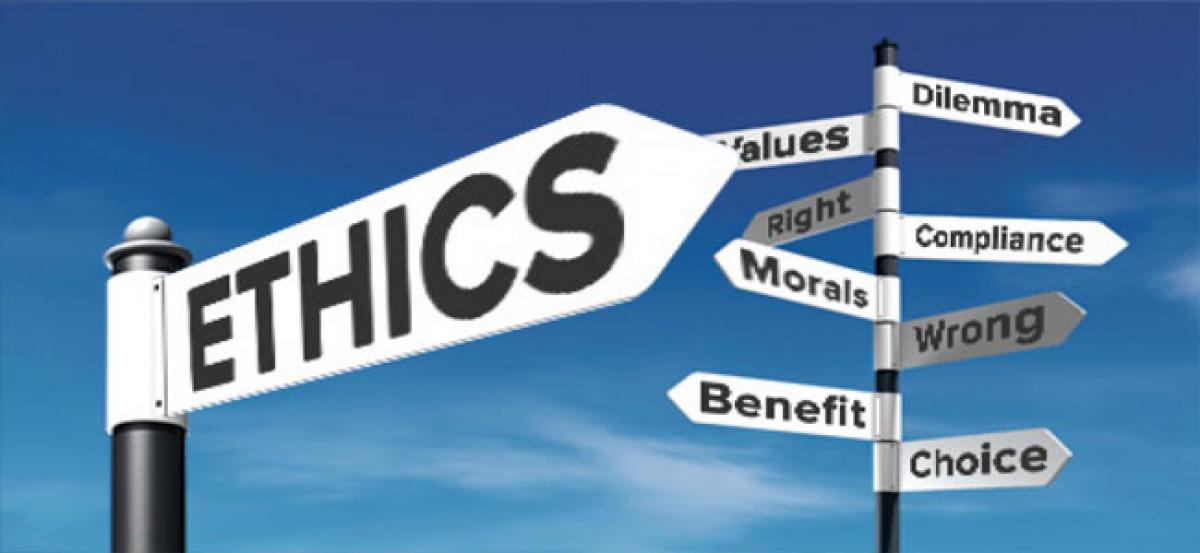Ethics in human interface

Ethics and morals relate to “right” and “wrong” conduct. While they are sometimes used interchangeably, they are different: ethics refer to rules provided by an external source, e.g., codes of conduct in workplaces or principles in religions. Morals refer to an individual’s own principles regarding right and wrong.
Ethics and morals relate to “right” and “wrong” conduct. While they are sometimes used interchangeably, they are different: ethics refer to rules provided by an external source, e.g., codes of conduct in workplaces or principles in religions. Morals refer to an individual’s own principles regarding right and wrong.
Source of Principles
Ethics are external standards that are provided by institutions, groups, or culture to which an individual belongs. For example, lawyers, policemen, and doctors all have to follow an ethical code laid down by their profession, regardless of their own feelings or preferences.
Ethics can also be considered a social system or a framework for acceptable behavior. Morals are also influenced by culture or society, but they are personal principles created and upheld by individuals themselves.
Consistency and Flexibility
Ethics are very consistent within a certain context, but can vary greatly between contexts. For example, the ethics of the medical profession in the 21st century are generally consistent and do not change from hospital to hospital, but they are different from the ethics of the 21st century legal profession.
An individual’s moral code is usually unchanging and consistent across all contexts, but it is also possible for certain events to radically change an individual's personal beliefs and values.
Conflicts Between Ethics and Morals
One professional example of ethics conflicting with morals is the work of a defense attorney. A lawyer’s morals may tell her that murder is reprehensible and that murderers should be punished, but her ethics as a professional lawyer, require her to defend her client to the best of her abilities, even if she knows that the client is guilty.
Another example can be found in the medical field. In most parts of the world, a doctor may not euthanize a patient, even at the patient's request, as per ethical standards for health professionals. However, the same doctor may personally believe in a patient's right to die, as per the doctor's own morality.
Key Differences Between Ethics and Values
The fundamental differences between ethics and value are described in the given below points:
1. Ethics refers to the guidelines for conduct, that address question about morality. Value is defined as the principles and ideals, which helps them in making the judgement of what is more important.
2. Ethics is a system of moral principles. In contrast to values, which is the stimuli of our thinking.
3. Values strongly influence the emotional state of mind. Therefore it acts as a motivator. On the other hand, ethics compels to follow a particular course of action.
4. Ethics are consistent, whereas values are different for different persons, i.e. what is important for one person, may not be important for another person.
5. Values tell us what we want to do or achieve in our life, whereas ethics helps us in deciding what is morally correct or incorrect, in the given situation.
6. Ethics determines, to what extent our options are right or wrong. As opposed to values, which defines our priorities for life.
Values and Beliefs
Values and beliefs are used to guide actions and behaviors. They are also used to form basic attitudes towards certain things.
The main difference between both terms is that beliefs are convictions, while values are ideas. Beliefs are those convictions that we generally hold to be true, usually without actual proof or evidence.
Values are stable, long-lasting beliefs about what is important to a person. They become standards by which people order their lives and guide how people make choices. A belief will evolve into a value when a person’s commitment to it develops and they see it as being important.
Thus values are those types of beliefs, which are more basic than other beliefs we may hold; they are central to our belief systems and thus to our attitudes. They are beliefs about how we ought to behave and about the desirability of certain end states .
The obstacles and common biases that influence our decision-making process and result in unethical conclusions
The process that leads to effective moral action can be roughly divided into three components:
1. Moral awareness: the process of identifying the ethical issues involved, the parties who have a stake in the action, what is at stake, and what the action options are.
2. Moral judgment: the process of weighing the ethical considerations that bearon the situation and determining the moral course of action.
3. Acting in accordance with moral judgment: deciding the right thing to do is not enough. One still needs to form the intention to do the moral thing and deal with practical obstacles in order to act effectively.
OBSTACLES TO GOOD ETHICAL DECISION-MAKING
Poor moral awareness: Poor moral awareness can either result in a failure to perceive the problem as being an ethical problem at all (in which case one does not go through the steps of good ethical decision making), or can present the agent with a distorted or insufficient picture of the problem to be resolved.
To overcome this obstacle: Identify the relevant obstacles to moral awareness and address them.Failure to gather relevant facts: Good practical decisions require that we know important facts relevant to the decision, such as those that help us determine the likely impact of the action on stakeholders.
To overcome this obstacle: Make sure to take the time to gather whatever facts are needed to come to a good decision. Don’t rush to judgment before all the facts are in. Since in many cases different stakeholders have interests that would be best served by different actions,
it is important to carefully vet the facts one gathers to ensure that they represent as unbiased a representation of the situation as possible. Precisely what facts or types of facts are necessary for a good judgment on the issue may not be clear at the beginning of the process. As one considers the situation from the perspectives of different stakeholders, the need for additional facts (or clarification of already attained facts) will probably arise.
Common biases
It can unconsciously influence our decision-making process and result in unintentionally unethical conclusions.
Biases about the world:
1. We tend to miscalculate the negative consequences of our behavior and the risk involved
2. We create inaccurate judgments about causal perceptions
3. We ignore low-probability events altogether
4. We deny uncertainty
5. We discount the future, giving disproportionally more weight to present consequences than anticipated future consequences.
Biases about other people:
1. Through ethnocentrism and stereotyping we inaccurately believe that our values and beliefs are superior to those of a different group.
2. We can be misguided by our trust in an “authority heuristic” – we often trust in the wisdom, expertise, and experience of authority figures, but occasionally this trust is misplaced and the heuristic becomes a harmful bias.
Biases about ourselves
1. We have illusions of superiority, sometimes because we misremember the past in our favour.
2. We have self-serving perceptions of fairness.
3. Overconfidence in our abilities causes us to mispredict our future ethical behavior.
To overcome this obstacle: Be mindful of these biases and rationalizations that we all commonly use and avoid them. Replace such rationalizations with a substantial and rigorous ethical deliberation process.

















